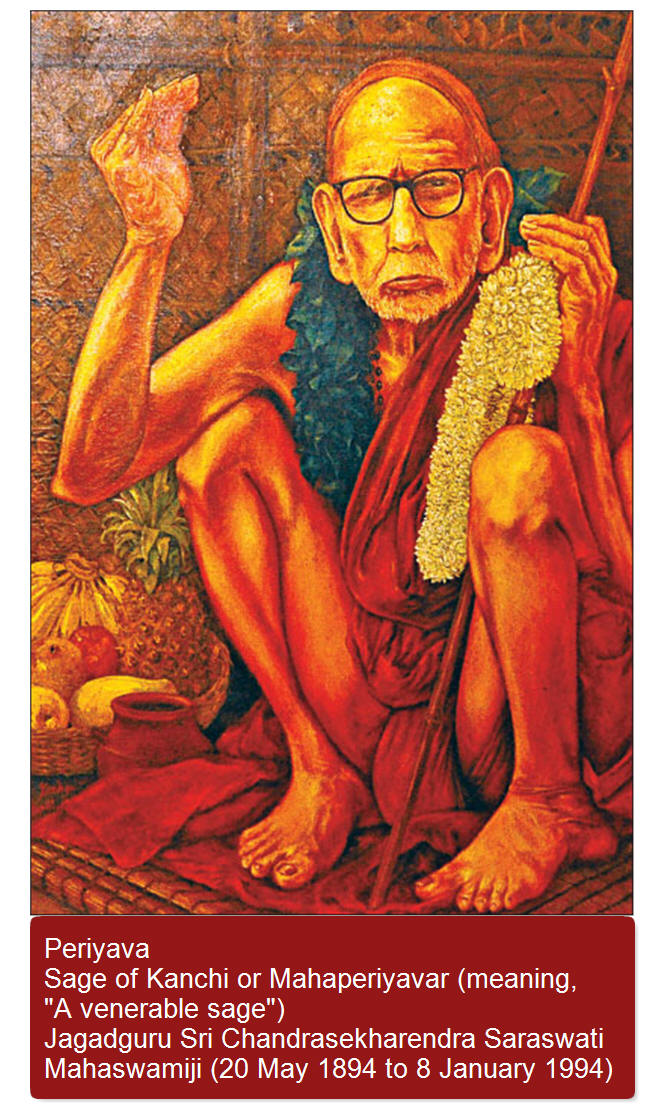By Periyava
Translation from Tamil: V. Krishnaraj
சடங்குகள் : தெய்வத்தின் குரல் (முதல் பகுதி)
Rites: Deivathin Kural (Part One)
Chapter 5 Do We Need Rituals?
http://www.kamakoti.org/tamil/part1kural91.htm

Periyava
Sage of Kanchi or Mahaperiyavar (meaning, "A venerable sage")
Jagadguru Sri Chandrasekharendra Saraswati Mahaswamiji (20 May 1894 – 8 January 1994)
Once an individual has soul experience, there is no need for rites and rituals. Did we get the true soul experience? Are we mature to attain it? We find out that we are far away from it, if we look at it from the perspective of internal purity. We have put a shroud on our true form, which is Ātmāṉantham (Joy of the soul). By doing Satkarma (good karma) and expanding Sat Vasanas, we can eliminate the bad Karmas and the bad Vasanas. The Karma will cease to exist. We may take the path of Soul enquiry. Until then, the karmas, and Pujas, belittled as mere rites, are essential.
It is proper for the ordinary people to observe all the prescribed rituals according to Sastras. We can show examples of the benefits to the sceptics. When a person observes the rituals without flaw or fail and with attention to the details, he gets one-pointed mind. Later, for the attainment of Ātma Dhyanam (concentration on the self), it is essential he has one-pointed mind. Since he is firm in following the injunctions of Sastras, he subjects himself to a discipline.
Not eating forbidden foods and avoidance of luxury help strengthen non-attachment. Despite difficulties, doing the rituals according to the injunctions of Sastras help develop will power. Following the path of Sastras as the only way without a question or a preconceived opinion helps develop humility and simplicity.
Observance of the so-called rituals without fail helps develop oneness of mind, discipline, non-attachment, will power, humility…and in all, there opens a path of morality. Without good conduct and decorum, Ātma Vichāram (self-enquiry) and soul experience (God realization) will not occur.
The Buddha did not sanction Vedic rites. He insisted on good conduct. The Paṅchasīla that Nehru often talked about is important for the Buddhists. The Buddha insisted on good conduct and dispensed with Vedic rites. Pūrvamimāsakars were content with Vedic Karmas and said not to worry about worshipping Īśvara. In our Sanatana Dharma, the rites, Karmās, conduct, Bakthi, and finally Ātma Jñāṉam are all woven or braided together. Your stand is you want Ātma Jñāṉam and not others. Impossible proposition. Ātma Jñāṉam is like milk and the others are the dregs. Take the example of the cow and the milk. If you want milk, you must have a cow. (Those days, they did not have milk forms. Now you get the pasteurized milk and not the dregs like cow dung…) If you have a cow, you get the cow dung and other undesirable products like dregs to go with the cow. It makes sense to keep the cow stall clear of dregs…use the milk and nurture the cow. We should obtain the usefulness of rites and rituals in a similar spirit. (I remember as a child visiting with my grandmother and maternal uncle in the village. They had cows, bulls, bullocks is separate stalls or sheds. The stalls were a mess with cow dung, urine and smell. Yes, we got the milk and then the unavoidable dregs.)
Rites and rituals are not essential for attainment of true Ātma Jñāṉam. Likewise, Īśvarā’s image (idols) is not essential. All these are at a higher stage of spiritual development. A greenhorn cannot reject it initially. Firstly, Īśvarā is essential. There are multiple reasons for it. Let me give you a pointer. We need a tangible and great example of a Murthy (Idol or image of God) replete with all auspicious qualities. We regarded Īśvarā as the repository of endless Kalyāṇa Gunas (auspicious qualities). Mere mention of the name Isvara makes us think of him as devoid of any undesirable qualities. Beauty, compassion, Power, Jñāṉam… in perfection and wholesomeness mean invariably Isvara. According to psychology, we become what we think. Ever thinking of auspicious qualities of Isvara, our faults and foibles desert us making us as good people.
The benefits from rites, rituals, Puja…help us become good people and introducing us to Dhyana Yoga with inaction and Jnana Vichāram (Quest of Spiritual wisdom).
2:15 PM 8/23/20182:15 PM 8/23/2018
#ffe6e6